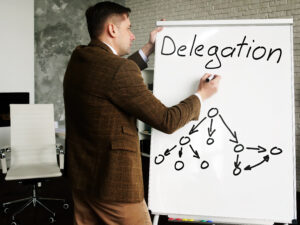Coaching and Delegation Skills
Course Overview

Coaching is increasingly becoming one of the most sought after and important skills for anyone in a work environment. It is a skill that no manager cannot live without. The days of direct commands from managers to their employees are long gone. The importance of inspiring and guiding employees to realize their abilities and discover their power and responsibilities can no longer be ignored. This is why any successful company is now deeply interested in formal and informal coaching carried out continuously in the workplace.
Many people are afraid to lose control of a task when they delegate or get substandard results. Many guidelines are provided in this course that help participants use the right strategies and know what level of responsibility and authority to use at each point.
Goal of Course:
Participants will learn how to delegate in a way that increases their own productivity in the long term by allowing growth for the delegatee.
The course is designed to deliver the following:
- Coaching Skills part will introduce you to the mentality of successful coaches, the effective methods of managing resistive or defensive coachees, the ability to control your emotions and to use others in inspiring and directing them towards achieving their goals.
- This course is designed to help participants master the art of delegation by overcoming the fears that prevent people from engaging in this activity and make the process as simple and straightforward as possible. Many people know the benefits of delegation but are afraid to use it. The systematic approach presented in this course, along with the benefits, ideal strategies, do’s and don’ts, can help anyone to scale up and become instantly more productive by delegating.
Duration:
2 days
Language:
English
Training Objectives
- Employ coaching principles in your environment and maximize others’ efficiency
- Use the GROW model to coach, question and guide a coachee
- Ask questions to maximize the efficiency of the coaching session, raise awareness and open up new possibilities
- Understand that creating trust and good communication are the keys to effective delegation.
- Improve productivity and efficiency through effective, intelligent and planned delegation.
- Identify different ways of delegating work
- Ask better questions and listen better
- Understand how to clarify and give clear instructions for better delegation results
- Identify tasks that can and can’t be delegated according to the strengths and weaknesses of the team.
- Assess risks of delegation and plan for any eventuality
- Test their delegation skills.
- Ensure you and all your staff remain motivated, contributing appropriate skills and developing new ones to manage and complete activities and projects successfully.
Module Outlines
Module 1: What is coaching?
- The difference between coaching and other kinds of instructional methods
- Sequence your coaching?
- What should you talk about first?
- The principles of coaching that you must adhere to
- Formal and informal coaching and how do they differ
- The best formal systems of coaching and how can you implement them at work
- Integrate your coaching with HR performance appraisals
- Raise the awareness of a coachee
- Use coaching in line with your management responsibilities
- Peer coaching?
Module 2: How to Motivate
- The main human needs
- Benefit from a variety of behavioral models to predict and motivate others
- Take advantage of the power of motivation in coaching
Module 3: How to Sequence Your Statements
- Use coaching in line with your management responsibilities
- Kinds of questions should you ask in each stage of the GROW model
- Ways to encourage others in the right direction
- Kinds of questions are ineffective in coaching and why
- Results from asking each type of question and how can you use this knowledge to coac
Module 4: How to Ask Questions
- Kinds of questions are ineffective in coaching and why
- Results from asking each type of question and how can you use this knowledge to coach
- Types of questions can you ask and their pros and cons
- Open and closed questions and how can they help when coaching
Module 5: Why Delegate
- The benefits of delegation?
- What happens if you don’t delegate
- Do we need to delegate more than ever before?
- Master delegation skills
Module 6: Why We Don’t Delegate Enough
- Why are we afraid of delegating?
- Overcome barriers to delegation
Module 7: Delegation Strategy
- The best strategies to delegate
- What should you delegate?
- Who should you delegate it to?
- When should you delegate?
- How should you delegate?
- The various types of delegation and advantages / disadvantages of each type
- The ideal level to delegate to and why this matters?
Module 8: How to Delegate
- Set up the scene and describe a task to a delegate
- What to avoid so you don’t undermine yourself?
- The 6-Step delegation process
- What is the significant of each step and what happens if you miss a step or don’t do it properly?
- The delegation technique into practice by getting inspired from example scenarios
Module 9: Monitor and Control a Delegated Task
- Problems can you expect when you delegate a task?
- Prevent problems by monitoring?
- Avoid micromanagement?
- How to delegate to a team?
- How to monitor your own performance to improve your delegation skills?
Customized Learning
Leap To Success is offering a variety of learning options to meet current realities and can be adapted to suit your business needs. These options include variants of online, blended and on-site course formats.
Face To Face Learning
Enabling you to have a face to face interactive and engaging learning experiences led by renowned industry experts and thought leaders with extensive practical experience who will employ a variety of interactive learning techniques, including short high-impact videos, case studies, assessments, role plays, in addition to on-going support.
Virtual Learning Labs
Interactive online learning held in real-time using Zoom and are led by international subject matter experts who incorporate case studies, breakout rooms, guided practice, simulations and discussions to maximise your learning experience.
General Methodology
Similar to any L2S training program, this program offers an interactive learning experience in which will allow the delegates to reflect on their learning through an informative, indulging, and fun classroom experience. The design of the training session focuses on the following attributes.
Concrete Experience: The delegates will learn by doing
Reflective Observation: Reflecting on the newly experienced skill-set
Abstract Conceptualization: Developing deeper understanding to the learned concepts
Active Experimentation: Providing the delegates with realistic tools that can be tested in the real life
Activities Brief
What Makes a Good Leader?
Leadership is absolutely key when it comes to setting goals, motivating staff, managing people and achieving results. Unfortunately too many leadership courses focus on extraordinary, inspirational leaders on the world stage. Tim in Accounts is never going to have the gravitas of Nelson Mandela, Amitra in Admin is no Angela Merkel. Nevertheless if all staff understand basic, leadership qualities it can make a real difference to their own everyday performance: presenting ideas, instigating change, pouring oil on troubled waters, showing objective judgement. This pack challenges many of the above ideas and puts leadership in a new light.
Mayhem:
This activity quickly descended into chaos! So I intervened after 8 minutes and talked to the whole group asking a few key questions. I then reset the clock and they finished the task with 30 seconds to spare. A triumph! And loads of learning points simply tumbled out.
Enable & Delegate
An experiential workshop that enables participants to understand and develop the attitudes, skills and behaviors required for the day to day informal coaching of others.
Sign Up For the Course
